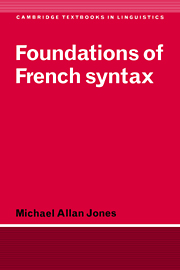9 - Infinitival clauses
Published online by Cambridge University Press: 14 January 2010
Summary
Overview
The discussion in this chapter relies heavily on the concept of Case introduced in 1.5.6 and developed in subsequent chapters.
In 9.2, this concept is exploited as a means of accounting for the absence of an overt subject in most types of infinitival clauses and for some systematic differences between English and French. A distinction is drawn between constructions in which the subject of the infinitive is empty in the underlying structure and is interpreted in relation to some participant in the main clause and constructions in which the subject of an infinitive is moved into the main subject position to acquire Case.
In 9.3, there is an examination of the syntactic strategies for expressing the subject in constructions with faire, laisser and verbs of perception, whose properties are strikingly different from their English counterparts and which often pose problems for learners of French. This discussion continues in 9.4 with a detailed analysis of the apparently complicated behaviour of clitic pronouns in these constructions.
9.5.1 summarises generalisations proposed in earlier chapters concerning the distribution of infinitives with de and a and ‘bare’ infinitives. Finally, in 9.5.2, there is a review of some similarities and differences between infinitives and gerunds (verb-forms in -ant).
- Type
- Chapter
- Information
- Foundations of French Syntax , pp. 412 - 462Publisher: Cambridge University PressPrint publication year: 1996



